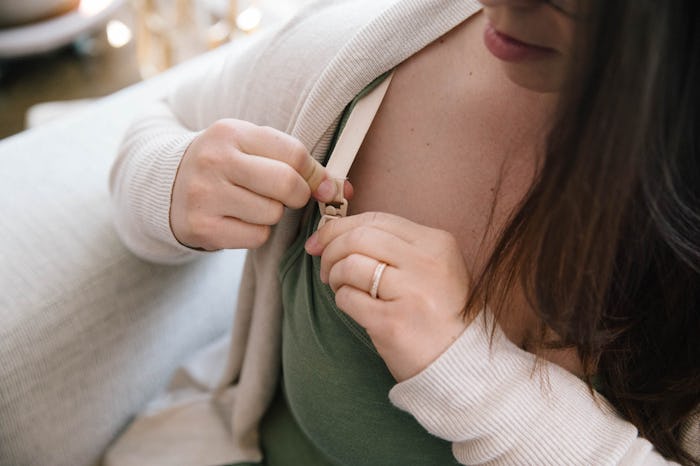Life
How To Dry Up Your Breast Milk Without Pain, According To Breastfeeding Experts
Breastfeeding is an awesome thing, full of benefits for both baby and mama. But sometimes circumstances are such that a woman can't breastfeed, she chooses not to, or she wants to stop before the weaning process naturally begins. In these cases, it can be a struggle to know how to dry up your breast milk without pain and causing yourself some major physical discomfort. Trying to go cold turkey will inevitably lead to aches and frustration, but there are gentler ways to dry up your supply over the course of a few weeks.
Brooklyn-based postpartum doula and Breastfeeding Educator Megan Davidson tells Romper that there are a variety of ways a lactating woman can dry up her milk, ideally under the supervision of a lactation specialist. "If you’ve been nursing or pumping regularly, a gradual approach is often easiest," says Davidson. "Slowly reducing the number of times you breastfeed or pump over the course of several weeks will be a more pleasant experience."
Lactaction Consultant Linda Smith explained on her website that, "Breasts make milk faster when they are 'empty' and slower when they have milk stored in them." In light of that, Smith recommended removing as little milk as necessary to keep from feeling painfully swollen. That way your body won't continue to produce more milk as quickly.
Davidson encourages women to try natural means to speed the drying-up process along and make it more comfortable while still safe. Speaking with Romper, her recommendations for lactating women include inserting cabbage leaves into your bra and drinking brewed herbal tea made from fresh or dried sage.
If those ideas sound like crunchy-mom hocus pocus, you might be surprised to learn that there is actual scientific confirmation. La Leche League International reported on a study comparing the use of chilled cabbage leaves to chilled over-the-counter gel packs, and found that pain was relieved within one to two hours of both treatments, but mothers actually preferred the cabbage treatment. Other sources such as Kelly Mom confirm Davidson's claim that sage is useful for its lactation suppression properties.
Although such home remedies are simple and can easily be executed by any individual, Davidson strongly recommends that women undertake the process of stopping lactation under the supervision of an experienced professional. If it seems like overkill to you, you're not alone. But when I did a little research of my own, it immediately became clear to me why it's best practice.
Pediatrics and Child Health journal found that, "A sudden, abrupt wean should only be considered in extreme circumstances and is hard on both of you... uncomfortable for you and upsetting for your baby." Uncomfortable for you in the sense that it puts you at increased risk of getting plugged ducts, mastitis, breast infection, or a breast abscess — certainly no walk in the park.
But in addition to the physical effects are the equally serious emotional ones. Remember that the postpartum months can be an emotionally fragile time, and hormone levels are closely tied to lactation. Drying up your supply too quickly could lead to some intense mood swings and even depression. It's important to be especially mindful of this if you have had a history of depression (postpartum or otherwise), or particularly stressful current circumstances.
Even done over the course of a few weeks this isn't easy, so reach out to a local lactation consultant (Le Leche League has a list of resources) for experienced guidance, or at the very least, ask your partner, a friend, or family member to be a listening ear during this time. Whatever your own personal reasons for needing to dry up your milk supply, it's an emotional thing for a woman to do and you deserve to have support as you proceed.
Check out Romper's new video series, Romper's Doula Diaries:
Check out the entire Romper's Doula Diaries series and other videos on Facebook and the Bustle app across Apple TV, Roku, and Amazon Fire TV.
